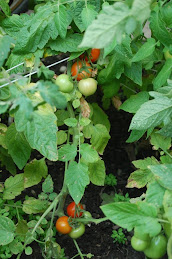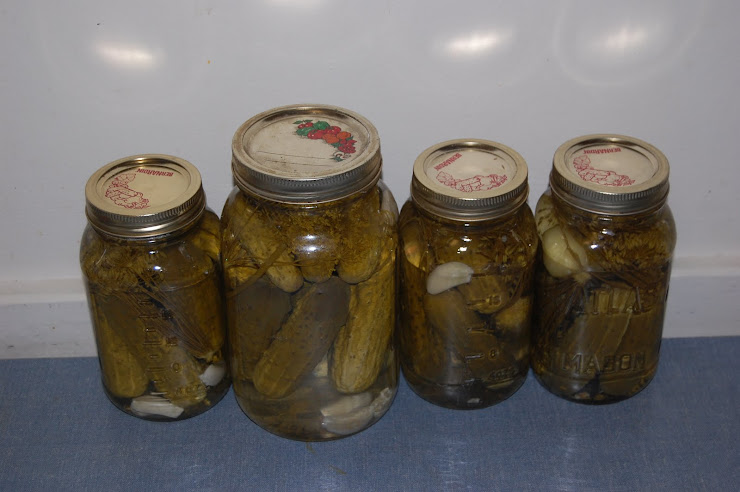
Back in March we participated in a Pantry Challenge, a month long experiment of trying to eat entirely from the food we had on hand without buying any more. This month there's another challenge, called October Unprocessed. The idea is to try to avoid using any kind of processed foods for the entire month and my fellow Pantry Challenge participants Canadian Doomer and FarmGal are playing along. I decided not to do the full challenge for a number of reasons but since I support the idea behind it, I'm aiming to add a few thoughts of my own periodically. Everyone has different definitions of what constitutes unprocessed - for example I would never buy things like premade pastry and I make my pumpkin pie from actual pumpkins, not canned, but I'm not about to grind my own flour to make pie crusts with!
The Russian and I are a DIY household on many fronts- partially because we like the experience of making things but also because we often have more time than income. Challenges like these are interesting for me because they draw attention to things we may not have considered and often provide ideas of how to do things better. The Pantry Challenge was a great example of this and one of things I quickly became aware of was how dependent we are on our freezer for much of our food storage. As this blog demonstrates, I do a lot of hot water bath canning but the majority of it is condiments and sauces. Gayla Trail of You Grow Girl calls it "Junk food for the Apocolypse" which is a fairly accurate portrayal. In a pinch it's somewhat nutritious food but not exactly the kind of meals that will sustain us for long. Not having a pressure canner means I don't have the ability to preserve any type of meat or low acid veggies in jars. Soup is also out unless is frozen. But being dependent on the freezer means we are also dependent on electricity and even in Toronto that can be an issue at times. In the Blackout of 2003 I was lucky- my block was on the same grid as a nearby hospital and we had power restored in under 6 hours and everything in my freezer survived. Others areas of my neighbourhood didn't see power for 3-5 days during one of the hottest Augusts on record! In 2009 we lost power for 3 days in the dead of winter and had to put the contents of the freezer in a cooler outside; everything survived thanks to the cold temps. We only have the usual sized refrigerator freezer but even that small space contains a good portion of our stored food, in the form of soups and stocks, fruit and vegetables, fresh meat and homemade prepared food like pierogies and gnocchi. To lose power for any length of time could mean the loss of a considerable amount of food. Finding alternate methods of storing food is frequently on my mind.
One the things that I wish was possible in a apartment is access to a root cellar or cold storage. I grew up with one in my chidhood home and my dad still keeps it full of supplies even tho there's only 3 people living there currently. It's been a long standing tradition among my siblings that when you're totally broke you can always visit mom and dad's and 'grocery shop' in the root cellar. It's mostly full of store bought canned goods, my dad's preserves and pickles and some produce but you could probably feed a family of 4 decently for a couple months on what they have on hand. In the apartment we live in now, we are so lacking in storage I don't have anywhere to keep even the smallest amount of pantry supplies outside of the tiny kitchen cabinet space. Even if there were storage options, the lack of temperature control makes it's impossible to keep anything perishable anywhere but the fridge. Last year I tried to keep apples in the sunporch but even tho it's unheated, the temperature remains at or above the temps in the apartment- southwest windows and a blacktar roof keep it toasty all winter! Great for me and the plants, deadly to stored food.
This week the prices on local root veggies are at their yearly best- we picked up 2 x Ontario new potatoes, yellow onions and carrots for $1.67/ 10bl bag each. Red onions were slightly more at $2.99/ 10 lbs but I'm doing some red onion jam this week so we picked those up too. That means there is currently 50 lbs of vegetables rolling around on the kitchen floor and we need to get creative with our storage. Here's one solution we came up with!

We're considering building some kind of insulated wooden storage box to stay outside on the deck. If we can make it raccoon and squirrel proof it might hold us until winter but once the temps go below freezing it won't be viable for veggies.
In the meantime I'm experimenting with another form of food perservation- drying. We don't own a dehydrator but having a gas oven with a pilot light means I have a low cost drying option already built in. In actuality it's free for us since we don't pay for gas here and don't have the option of turning it off in any case. I've used it for tomatoes for years but never bothered to try much else. In the past few weeks I've been trying out other possibilites with some success- onions, both green and bulb seem to work well. Celery leaves dried in hours. Corn dried out okay but whether it will be edible when reconsituted is another story- it might be okay in soup or I may just grind it to corn meal.

I'm attempting to dry carrots for the first time today- given their density I suspect it will take few day so I'm not sure what to expect. The Russian inadvertantly demonstrated that potatoes can be dried this way too- I'd been hesitant to attempt potatoes because I was concerned that they'd turn brown and unappealing but these ones look fine for being left in the oven for two days by mistake! I think the trick here was that he partially cooked them at very high heat then shut the oven off. They're still a bit moist in the centre so I'll finish them at the same time as the carrots.

Along with the dried cherry tomatoes and the beans I grew this year, the shelf is filling with jars of dehydrated veggies. If nothing else at least I have the makings of some good soups!

















.jpg)




Kernel corn turns slightly brown, but it turns out quite nicely in soup or stew. Potatoes *do* have to be partially cooked, but I've dried mashed (no milk or butter), slices and grated.
ReplyDeleteI was thinking of your successful drying techniques when I decided to go for it! Drying in the oven seems a bit different than a dehydrator tho- less airflow and possibly more heat. I'll have to see how it affects the end product.
ReplyDelete